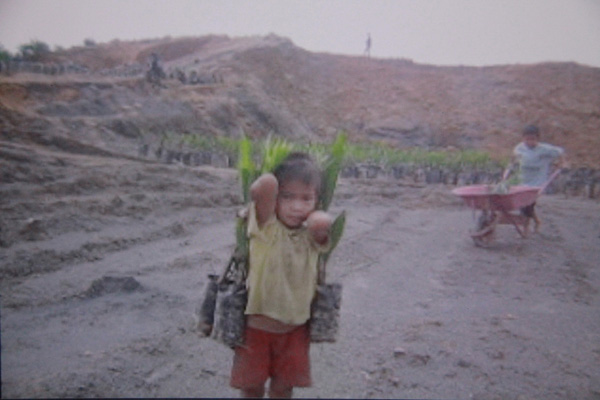Editor’s note: PT Sinar Sawit Andalan (SSA) has strongly denied these accusations and says it has no company policy to employ children. SSA adds that its policy also applies to vendors and says any breach of the policy would result in termination of the employees or vendors involved.

Oil palm plantation.
School-age children were caught on camera working for a palm oil plantation company, PT Sinar Sawit Andalan (SSA), in Indonesia’s West Kalimantan province.
Hovek, a resident of the area, recorded video of the children working when he visited the plantation to investigate claims that the company’s permit area overlapped with indigenous land. He said he saw about 60 children working – filling 10-kilogram polybags with soil – at the company camp in West Kalimantan’s Sintang district.
“They were actually still school age,” Hovek said in Pontianak on Wednesday. “But they were already pushing carts of polybags from the soil depots to the nursery. The children who were not yet capable of lifting 10-kilogram polybags were just pulling weeds.”
After talking with the children, Hovek discovered that most of them were from the nearby Kesange village. They had been forced to leave school and were accompanying their parents, who also worked on the plantation. The children were paid Rp 500 ($0.05) per polybag, though Hovek added that for the past three months the children have not received their wages.
“Many of them stopped working because they did not receive the wages that were promised to them by the company. The company has not yet paid around 37 thousand polybags [worth of wages] to the child workers,” he said.

PT SSA’s Corporate Social Responsibility (CSR) officer, Yohanes, denied that the company employed underage workers. “There is no way the company employs child workers in the plantation. Every month we send a report [with our employment records] to the Manpower and Transmigration Department [Disnakertrans], which is used to arrange for Social Security, Sinarmas insurance, and other things.”
Yohanes said the children often accompany their parents to work because no one is there to care for them at home. In one village, he said, the company has actually helped set up a daycare in one of the local houses. “It is managed by the village government, but the babysitters are paid for by the company,” he said.
Alik Rosyad, head of the West Kalimantan Commission for Child Protection (KPAID), said there are legal requirements, including limitations on working hours and type of work, that must be followed by companies who employ underage children. First and foremost, he said, work must not interfere with a child’s education.
“These children have a right to receive an education. Because of that, children are not recommended to work. However, sometimes for economic reasons, children are required to make money. So, if there’s an economic reason, what needs to be ensured is that the work does not keep them from going to school. If this happens, the company has taken away the child’s right to go to school,” Alik said in Pontianak.
PT SSA acquired a 20,000-hectare permit area in Sintang district in 2008. The company is controlled by PT Agro Harapan Lestari, a unit of Singapore-based Goodhope Asia Holdings.
Related articles







